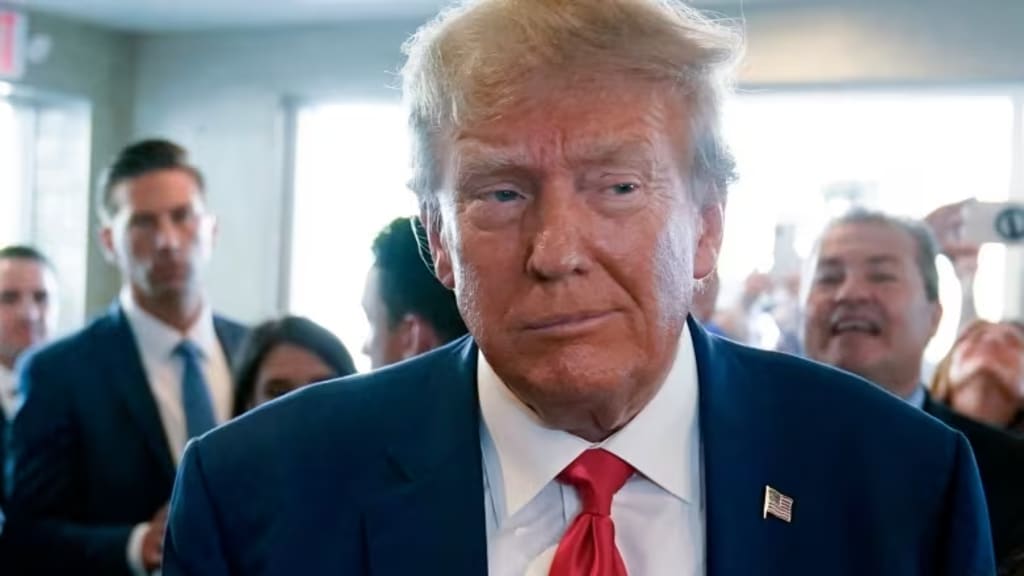Donald Trump enters a not guilty plea to all 37 charges in the case involving the confidential papers.
Donald Trump not guilty

Once a powerful figure in the political arena, Donald Trump now found himself standing in a crowded courtroom, his face etched with a mix of determination and concern. The weight of the world seemed to rest on his shoulders as he faced the judge, preparing to enter his plea.
The air inside the courtroom was heavy with anticipation, the gallery filled with curious onlookers, journalists, and supporters. Whispers of speculation and intrigue filled the space, as everyone awaited the moment that would shape the future of the man who had once held the highest office in the land.
The judge, a stern yet fair figure, peered over his glasses at Trump, ready to begin the proceedings. The room fell into silence as the judge read the charges, one by one, each carrying its own weight of accusation and potential consequences. The weight of those charges seemed to hang in the air, casting a shadow over the room.
"Donald J. Trump," the judge intoned, "you are being charged with 37 criminal offenses, including conspiracy, obstruction of justice, and unauthorized disclosure of classified information."
The gravity of the situation was not lost on Trump. Memories of his tumultuous presidency, the battles fought, and the decisions made came flooding back to him. The weight of responsibility, the pressures of leadership, and the consequences of his actions all seemed to converge in this very moment.
Trump's eyes scanned the room, searching for a familiar face, someone who could offer him solace amidst this storm. His gaze met the eyes of his family members, standing steadfastly by his side. Their expressions reflected a mix of concern, loyalty, and unwavering support. It was a reminder that no matter the outcome, they would face it together.
As the judge finished reading the charges, he turned to Trump and posed the question that would determine the trajectory of the trial. "How do you plead?"
Trump took a deep breath, his heart pounding in his chest. The weight of the charges and the potential consequences weighed heavily on his conscience. Yet, with unwavering resolve, he looked up at the judge and spoke with a firm voice, "Not guilty, Your Honor."
A hush fell over the courtroom as those words echoed through the air. Some gasped in surprise, while others erupted into whispers of disbelief or satisfaction. Emotions ran high, reflecting the deeply divided opinions that had come to define Trump's time in office.
For Trump, pleading not guilty was more than a legal strategy; it was an assertion of his belief in his innocence, an opportunity to prove his version of events. He knew that the road ahead would be arduous, fraught with challenges and the scrutiny of the public eye. But in that moment, he resolved to fight, to defend himself against the charges he vehemently denied.
As the trial unfolded, the courtroom became a theater of legal battles, as lawyers dissected evidence, debated interpretations, and presented arguments that aimed to shape the narrative of Trump's presidency. Each day, the emotions in the room oscillated between hope and despair, as the truth became harder to discern beneath layers of complexity.
Supporters rallied outside the courtroom, their unwavering chants creating a symphony of belief, while critics denounced his every move. The media circus intensified, the world watching with bated breath, as the trial captivated the nation.
As the trial drew to a close, Trump's fate rested in the hands of the jury. They deliberated for what felt like an eternity, weighing the evidence, the testimonies, and the arguments. The room held its breath as the verdict was read aloud.
"Not guilty."
The words reverberated throughout the courtroom, engulfing Trump in a mixture of relief and disbelief. For him, it was a validation of his unwavering belief in his own
innocence. Trump's eyes welled up with tears as he realized that, against all odds, he had been acquitted of all charges.
The courtroom erupted into a frenzy of emotions. Some erupted into cheers and applause, celebrating what they believed to be a triumph of justice. Others stood in stunned silence, their faces reflecting a mix of disappointment and anger.
In that moment, Trump felt a surge of gratitude for his legal team, who had fought tirelessly to defend him. He knew that their expertise, dedication, and unwavering belief in his innocence had played a significant role in securing this outcome. He turned to them, his eyes filled with genuine appreciation, silently mouthing the words, "Thank you."
As he exited the courtroom, Trump was met with a wave of conflicting emotions. Relief washed over him, knowing that he had successfully navigated the storm and emerged unscathed. But the scars of the trial would forever remain, a constant reminder of the tumultuous journey he had endured.
Outside the courthouse, Trump was greeted by a divided public. Supporters hailed him as a victorious hero, rallying behind his proclaimed innocence. They embraced him, waving signs and shouting words of encouragement. Yet, amidst the jubilation, he could not ignore the glare of
In the end, the story of Donald Trump pleading not guilty to all 37 criminal charges in the classified documents case serves as a poignant reminder of the complexities and divisions that exist within our society. It highlights the weight of power, the pursuit of justice, and the consequences of one's actions.
Regardless of where one stands on the political spectrum, this story reminds us of the importance of upholding the principles of transparency, accountability, and the rule of law. It underscores the significance of a fair and impartial judicial system, where individuals are given the opportunity to defend themselves against accusations.
While the trial may have reached its conclusion, the impact on Donald Trump's life and political legacy is far from over. The trial has left an indelible mark on his reputation, shaping the way he is perceived and remembered by the public. It is a reminder that our actions, especially those carried out in positions of power, have long-lasting repercussions.
Ultimately, the resolution of the trial does not resolve the deep-seated divisions within society. The story of Donald Trump's plea and subsequent acquittal serves as a call for reflection, dialogue, and the pursuit of common ground. It challenges us to confront the complexities of our political landscape and strive for unity and understanding, even in the face of deep disagreements.
As time moves forward, the emotional story of Donald Trump pleading not guilty to all 37 criminal charges will be written in the annals of history, serving as a reminder of the fragility of power, the pursuit of justice, and the enduring impact of our choices.






Comments
There are no comments for this story
Be the first to respond and start the conversation.